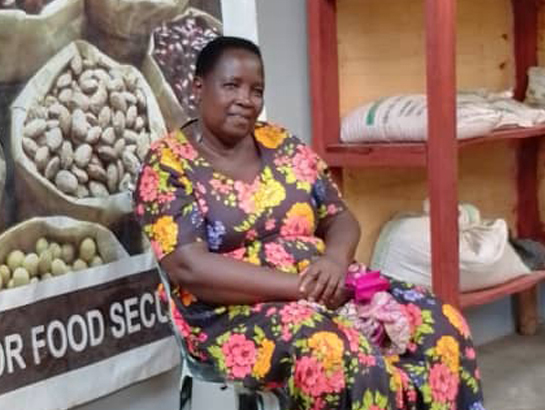Climate change and other global crises have caused ongoing shocks to food systems, disrupting supply chains, reducing incomes, and raising food prices—exacerbating malnutrition. Women and children, who have higher nutrient needs, are especially susceptible to dietary deficiencies and inequitable social norms that lead to life-long negative impacts on their development and health.
With funding support from the Government of Canada, the “Expanding Nutrients in Food Systems” project seeks to increase the consumption of nutritious foods, especially among women, girls, and children under five years of age. It also aims to increase women’s income by empowering them with agronomic skills and entrepreneurial capacity. The project will provide access to biofortified crops to over 11 million vulnerable women, men, and children in food-insecure regions across Bangladesh, India, Pakistan, Uganda, and Zimbabwe. It aims to improve their nutrition security and livelihoods, and build healthier futures.
Impact in Uganda
The demand for biofortified crops significantly increased in the Ugandan districts of Luwero and Iganga, driving an increase of nutrients in local diets. According to Tumwesigye Julius, a HarvestPlus extension worker in Luwero, “seed and vine multipliers are requesting more biofortified seed for the next planting season.” This surge in demand is attributed to a two-month radio campaign that sensitized stakeholders—including adolescent girls, men and women smallholder farmers, business owners, community leaders, and extension officers—on the benefits of biofortified crops.
Launched in March 2024, the radio campaign effectively raised awareness and improved knowledge on the importance of consuming nutrient-enriched crops for better health and nutrition. It also directed farmers to sources where they could purchase biofortified beans.
At the Kasala Twezimbe Seed Bank in Luwero district, Jane Sebyala, the treasurer, has been selling biofortified seeds for two years. Between 2021 and 2023, their sales of iron bean seed ranged from 200 to 500 kilograms, mostly to nearby communities. However, after the radio promotional messages were aired, the Kasala Twezimbe group received a surge in requests for biofortified planting materials, selling over two metric tons of bean seeds that was cultivated over 40 hectares. In this part of Uganda, iron deficiency and other micronutrient deficiencies are major threats to the well-being of people, especially the women.
Sebyala witnessed the increasing demand firsthand. “Since we started the Kasala seed bank, we have never made as many sales as we did in this past season,” she marveled. “This season was different. We managed to sell two tonnes of seed, thanks to the radio campaign by HarvestPlus. We have even received requests from far-off districts such as Nakasongola,” she added.
Due to the campaign’s broad reach, interest in nutrient-enriched planting materials among vulnerable smallholder farmers peaked in districts beyond the project’s target areas, such as Jinja, Namutumba, and Nakasongola. Feedback from extension workers receiving calls from Namutumba and Nakasongola confirmed that connecting farmers to nearby sources of seed in their districts helped boost seed sales.
According to Sebyala, this is only the beginning. She says, “I am hopeful that in the next season, we shall sell about five tonnes of seed. The radio announcements have been very helpful.”
HarvestPlus intends to continue creating awareness about biofortified crops among stakeholders, especially women farmers and women-led small and medium sized enterprises (SMEs), whose capacity to grow, cook, and profitably sell the crops will be enhanced through radio campaign and field days.
